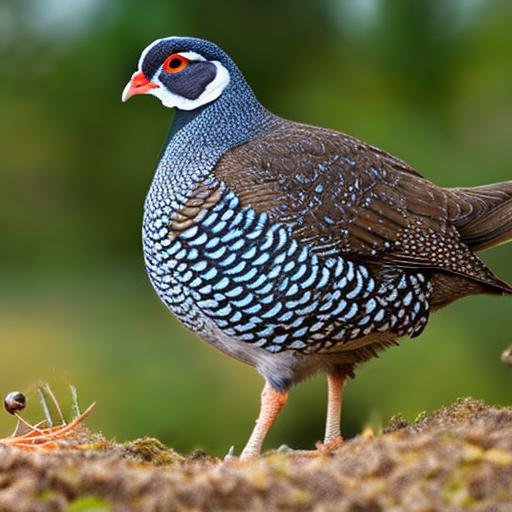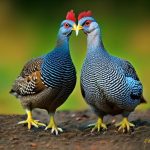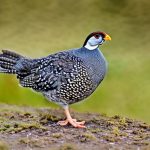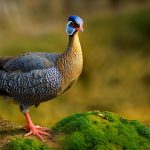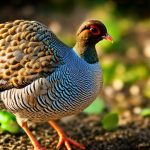When it comes to housing guinea fowl, it’s important to provide them with a safe and secure environment that meets their specific needs. Guinea fowl are known for their strong flocking instincts and can be quite skittish, so it’s essential to provide them with a spacious and well-protected coop or housing structure. When choosing the right housing for guinea fowl, it’s important to consider factors such as size, ventilation, and predator protection.
Guinea fowl require a coop that is spacious enough to allow them to move around freely and exhibit their natural behaviors. A good rule of thumb is to provide at least 3-4 square feet of space per bird inside the coop, and even more space in the outdoor run area. This will help prevent overcrowding and reduce the likelihood of aggressive behavior among the flock. Additionally, guinea fowl are known for their loud calls and can be quite messy, so it’s important to choose a housing structure that is easy to clean and maintain.
In terms of ventilation, guinea fowl require good air circulation to prevent respiratory issues and maintain overall health. The coop should have adequate windows or vents to allow fresh air to flow through the space, while still providing protection from drafts and extreme weather conditions. It’s also important to consider predator protection when choosing housing for guinea fowl. These birds are vulnerable to predators such as foxes, raccoons, and birds of prey, so the coop should be constructed with sturdy materials and secure locks to prevent unauthorized entry. Additionally, it’s a good idea to install fencing around the outdoor run area to further protect the flock from potential threats. Overall, choosing the right housing for guinea fowl involves providing a spacious, well-ventilated, and predator-proof environment that meets their specific needs.
Key Takeaways
- Choose a housing option that provides protection from predators and the elements for guinea fowl
- Provide a balanced diet of grains, greens, and insects to ensure proper nutrition for guinea fowl
- Create a secure environment with adequate space for guinea fowl to roam and explore
- Understand the social behavior and vocal communication of guinea fowl to promote a harmonious flock
- Maintain good hygiene, provide regular veterinary care, and practice biosecurity measures to prevent diseases in guinea fowl
- Manage breeding and reproduction by providing nesting areas and monitoring mating behavior in guinea fowl
- Handle and train guinea fowl with patience and positive reinforcement to promote a happy and healthy flock
Providing the Proper Diet and Nutrition for Guinea Fowl
Proper diet and nutrition are essential for maintaining the health and well-being of guinea fowl. These birds are omnivores and have specific dietary requirements that must be met in order to thrive. When it comes to providing the proper diet for guinea fowl, it’s important to consider factors such as protein content, essential nutrients, and access to fresh water.
Guinea fowl require a diet that is high in protein to support their growth, feather development, and overall health. A good quality game bird feed with around 24-26% protein content is recommended for guinea fowl. Additionally, offering supplemental sources of protein such as mealworms, crickets, or small fish can help meet their dietary needs. It’s important to provide access to fresh water at all times, as guinea fowl can quickly become dehydrated, especially during hot weather or when laying eggs.
In addition to protein, guinea fowl require a balanced diet that includes essential nutrients such as vitamins and minerals. Providing access to grit or small stones is important for guinea fowl, as it helps them grind their food in their gizzards for proper digestion. Additionally, offering access to greens, fruits, and vegetables can help provide essential vitamins and minerals that may be lacking in their regular feed. Overall, providing the proper diet and nutrition for guinea fowl involves offering a high-protein game bird feed, supplemental sources of protein, access to fresh water, grit, and a variety of greens, fruits, and vegetables.
Creating a Safe and Secure Environment for Guinea Fowl
Creating a safe and secure environment for guinea fowl is essential for their overall well-being and protection from potential threats. Guinea fowl are known for their skittish nature and strong flocking instincts, so it’s important to provide them with a space that offers protection from predators and other potential dangers. When creating a safe and secure environment for guinea fowl, it’s important to consider factors such as fencing, predator protection, and shelter options.
Fencing is an important consideration when creating a safe environment for guinea fowl. The fencing should be sturdy and tall enough to prevent the birds from flying over or predators from gaining access. A good rule of thumb is to use fencing that is at least 6 feet tall to prevent guinea fowl from escaping or being targeted by predators. Additionally, it’s important to bury the fencing underground or use an apron design to prevent predators from digging underneath and gaining access to the flock.
Predator protection is another important aspect of creating a safe environment for guinea fowl. The coop or housing structure should be constructed with sturdy materials and secure locks to prevent unauthorized entry by predators such as foxes, raccoons, or birds of prey. Additionally, it’s a good idea to install motion-activated lights or alarms to deter potential threats from approaching the flock. Providing shelter options such as trees or shrubs can also offer additional protection from predators and provide a sense of security for the flock. Overall, creating a safe and secure environment for guinea fowl involves using sturdy fencing, predator protection measures, and providing shelter options that meet their specific needs.
Understanding the Social Behavior and Communication of Guinea Fowl
Guinea fowl are highly social birds that exhibit complex behaviors and communication patterns within their flock. Understanding their social behavior and communication is essential for providing them with a happy and healthy environment. Guinea fowl are known for their strong flocking instincts and prefer to live in groups, so it’s important to provide them with opportunities for social interaction and bonding.
Guinea fowl communicate with each other through a variety of vocalizations and body language. They are known for their loud calls and can be quite vocal when expressing excitement, alarm, or distress. Additionally, guinea fowl use body language such as head bobbing, wing flapping, and tail wagging to communicate with each other and establish social hierarchies within the flock. Understanding these communication patterns can help caretakers identify potential issues within the flock and address them accordingly.
In terms of social behavior, guinea fowl are known for their strong flocking instincts and prefer to live in groups. They form close bonds with other members of their flock and rely on each other for protection and companionship. It’s important to provide guinea fowl with ample space to move around freely and exhibit their natural behaviors within the flock. Additionally, providing opportunities for social interaction such as perches or roosting areas can help promote bonding and reduce stress within the flock. Overall, understanding the social behavior and communication of guinea fowl involves recognizing their vocalizations, body language, and providing opportunities for social interaction within the flock.
Maintaining Health and Preventing Diseases in Guinea Fowl
Maintaining the health of guinea fowl is essential for ensuring their overall well-being and longevity. Guinea fowl are generally hardy birds but can be susceptible to certain diseases if proper care is not taken. Preventative measures such as regular health checks, vaccination protocols, and biosecurity practices can help maintain the health of guinea fowl and prevent the spread of diseases within the flock.
Regular health checks are an important part of maintaining the health of guinea fowl. Caretakers should monitor the birds for any signs of illness or injury on a daily basis. This includes observing their behavior, appetite, droppings, and overall appearance for any abnormalities. Additionally, providing regular access to clean water, nutritious feed, and a clean living environment can help support their overall health.
Vaccination protocols are another important aspect of maintaining the health of guinea fowl. Certain vaccines such as Newcastle disease or avian influenza may be recommended depending on the region and potential disease threats. It’s important to consult with a veterinarian or poultry health expert to develop a vaccination plan that meets the specific needs of the flock.
Biosecurity practices are essential for preventing the spread of diseases within the flock. This includes implementing measures such as quarantine protocols for new birds, limiting exposure to wild birds or other potential carriers of disease, and maintaining strict hygiene practices within the coop or housing structure. Overall, maintaining the health of guinea fowl involves regular health checks, vaccination protocols, and biosecurity practices that help prevent diseases within the flock.
Managing Breeding and Reproduction in Guinea Fowl
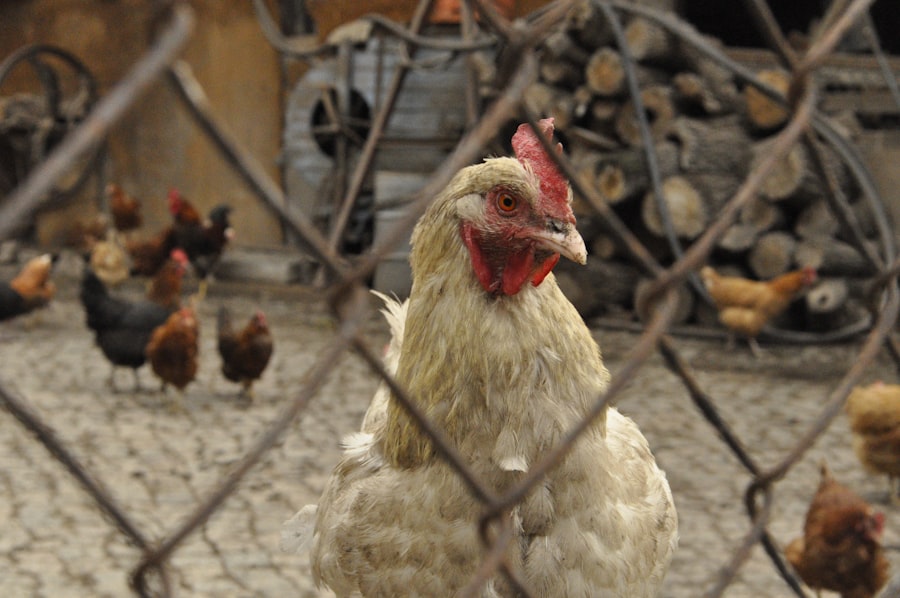
Managing breeding and reproduction in guinea fowl requires careful planning and consideration of factors such as breeding season, nesting options, and incubation methods. Guinea fowl are known for their strong breeding instincts and can be prolific layers under the right conditions. When managing breeding and reproduction in guinea fowl, it’s important to consider factors such as providing suitable nesting options, monitoring breeding behavior, and ensuring proper care for eggs and chicks.
Breeding season for guinea fowl typically occurs in the spring or early summer when daylight hours increase. During this time, caretakers should provide suitable nesting options such as secluded areas with straw or hay where hens can lay their eggs in peace. It’s important to monitor breeding behavior closely to ensure that hens are laying eggs regularly and exhibiting normal reproductive behaviors.
Incubation methods are an important consideration when managing breeding in guinea fowl. Hens may choose to incubate their eggs naturally or caretakers may choose to collect eggs for artificial incubation. If eggs are collected for artificial incubation, it’s important to provide proper temperature and humidity levels throughout the incubation period to ensure successful hatching.
Proper care for eggs and chicks is essential for managing reproduction in guinea fowl. Once chicks hatch, they should be provided with a warm brooding area with access to heat lamps or brooders until they are fully feathered. Additionally, providing access to high-quality chick starter feed and clean water is essential for supporting their growth and development.
Overall, managing breeding and reproduction in guinea fowl involves providing suitable nesting options, monitoring breeding behavior, choosing appropriate incubation methods, and ensuring proper care for eggs and chicks.
Handling and Training Guinea Fowl for a Happy and Healthy Flock
Handling and training guinea fowl is an important aspect of caring for these birds and promoting a happy and healthy flock. Guinea fowl can be quite skittish by nature but can be trained to become more comfortable with human interaction over time. When handling and training guinea fowl, it’s important to consider factors such as gentle handling techniques, positive reinforcement methods, and providing opportunities for socialization.
Gentle handling techniques are essential for gaining the trust of guinea fowl and reducing stress during interactions. Caretakers should approach guinea fowl calmly and avoid making sudden movements or loud noises that may startle them. It’s important to handle them gently but confidently while supporting their body weight to prevent injury.
Positive reinforcement methods can help train guinea fowl to become more comfortable with human interaction over time. This can include offering treats such as mealworms or small pieces of fruit when they approach or interact with caretakers in a positive manner. Additionally, spending time near the flock without making direct contact can help them become more accustomed to human presence.
Providing opportunities for socialization is important for training guinea fowl to become more comfortable with human interaction. This can include spending time near the flock during feeding or providing enrichment activities such as perches or roosting areas where they can interact with caretakers in a positive manner.
Overall, handling and training guinea fowl involves using gentle handling techniques, positive reinforcement methods, and providing opportunities for socialization that help promote a happy and healthy flock.
Guinea fowl are known for being skittish and easily stressed, so it’s important to approach them calmly and quietly. Positive reinforcement, such as using treats to reward desired behaviors, can help build trust and cooperation. Additionally, providing opportunities for socialization, such as allowing the flock to free-range in a safe environment, can help reduce stress and promote overall well-being. By using these gentle handling techniques, positive reinforcement methods, and promoting socialization, guinea fowl can thrive and contribute to a harmonious flock dynamic.
If you’re considering keeping guinea fowl at home, it’s important to provide them with a suitable coop for their needs. A well-designed coop can ensure their safety and comfort while also making it easier for you to care for them. For tips on choosing the best coop for your guinea fowl, check out this informative article on what kind of coop is best for chickens. It offers valuable insights into the different types of coops available and how to select the right one for your feathered friends.
FAQs
What are guinea fowl?
Guinea fowl are a type of bird that are native to Africa. They are known for their distinctive spotted feathers and loud, chattering calls.
What do guinea fowl eat?
Guinea fowl are omnivores and will eat a variety of foods including insects, seeds, grains, and small reptiles. They are also known to forage for food on the ground.
How do I house guinea fowl?
Guinea fowl should be provided with a secure coop or shelter to protect them from predators and the elements. The coop should have roosting bars and nesting boxes for the guinea fowl to sleep and lay eggs.
Do guinea fowl need a lot of space?
Guinea fowl are active birds and require a large outdoor space to roam and forage. They are not well-suited to small, confined areas.
What are the benefits of keeping guinea fowl?
Guinea fowl are known for their ability to control insect populations, making them beneficial for pest control in gardens and on farms. They also produce flavorful eggs and can be raised for meat.
Are guinea fowl noisy?
Guinea fowl are known for their loud calls and can be noisy, especially when they feel threatened or are disturbed. It’s important to consider the noise factor when keeping guinea fowl in a residential area.
Do guinea fowl require special care?
Guinea fowl are relatively low-maintenance birds, but they do require access to fresh water, a balanced diet, and protection from predators. They also benefit from regular health checks and access to dust baths for grooming.
Meet Walter, the feathered-friend fanatic of Florida! Nestled in the sunshine state, Walter struts through life with his feathered companions, clucking his way to happiness. With a coop that’s fancier than a five-star hotel, he’s the Don Juan of the chicken world. When he’s not teaching his hens to do the cha-cha, you’ll find him in a heated debate with his prized rooster, Sir Clucks-a-Lot. Walter’s poultry passion is no yolk; he’s the sunny-side-up guy you never knew you needed in your flock of friends!

